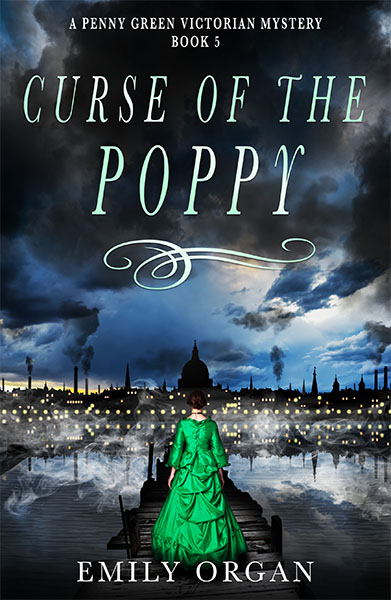
When power is challenged, the consequences can be fatal.
A woman dies in a burglary in Fitzrovia. A man is murdered in an opium den in Limehouse. News reporter Penny suspects the two deaths are connected, but how can she prove it?
The answer may lie in Whitehall where the India Office reaps the benefits of Britain’s opium trade. But when Inspector James Blakely of Scotland Yard begins investigating, he disappears.
Penny can’t hide her concern for the inspector, even though he’s about to marry someone else. Her loyalties are put to the test when Inspector Blakely’s fiancée requests her help. It’s soon apparent that powerful forces are at play. And Penny’s closer to them than she realises…
Curse of the Poppy is book 5 in the Penny Green Victorian Mystery Series. Available as ebook, paperback, hardback and audiobook. Free to read with Kindle Unlimited.
Book 1 – Limelight
Book 2 – The Rookery
Book 3 – The Maid’s Secret
Book 4 – The Inventor
Book 5 – Curse of the Poppy
Book 6 – The Bermondsey Poisoner
Book 7 – An Unwelcome Guest
Book 8 – Death at the Workhouse
Book 9 – The Gang of St Bride’s
Book 10 – Murder in Ratcliffe
Book 11 – The Egyptian Mystery
Book 12 – The Camden Spiritualist
Read an excerpt from Curse of the Poppy The dark spire of All Saints church pierced the summer morning mist as I reached the eastern end of Margaret Street. An inquisitive crowd had gathered outside the townhouse, too busy sharing the news to make way for a carriage which was attempting to pass along the road. The horse shied, parting the mob and frightening the children who were trying to get to their school at the end of the street. I could see the upper storeys of the narrow, red-brick house. The curtains were drawn across the tall sash windows and the front door was obscured by the crowd. “Press! Make way!” I called out, hoping this would hasten my progress through the throng. A few people moved, but the majority stayed put. I readied myself with a pencil and notebook in the hope that I might be able to speak to a police officer. “There ’e is!” came a shout. “Mr Forster! That’s ’im!” someone else cried out. “Where?” shouted another. I pushed forward, keen to catch sight of the man who had been tragically widowed after the events of the previous night. Someone shoved me from behind and my spectacles slid halfway down my nose. I pushed them back into place and tried to remain calm. A row of police constables kept the crowd at a distance from the house. Beyond them I could see an ashen-faced man in a dark suit and top hat standing beside the door. He had copper-coloured whiskers and his eyes darted nervously across the noisy crowd. He was conversing with a police officer, whose uniform bore the insignia of a chief inspector, and a man wearing a blue-checked suit, who I guessed was a detective. “Keep yer elbows to yerself!” shouted a woman behind me. “Where was you dug up?” another retorted. A fourth man, who appeared to be a friend of Mr Forster’s, joined the group standing outside the house. He was short and round, smartly dressed and wore a top hat and spectacles. The man rested a hand on Mr Forster’s shoulder as a gesture of comfort. I could hear other reporters in the crowd shouting out questions to the group of men, but nobody responded. It was clear that the police had no wish to speak to the press at that moment. “Mind yerself, else I’ll roll yer in the mud!” shouted the woman who had complained about the elbows. “Not afore I punch yer face!” replied the other. With the crowd growing restless and the police ignoring the reporters gathered, I decided to move to a quieter part of the street and find someone who might be of use to interview. An anxious-looking lady stood in the doorway of the house next to the church. She wore a dark blue woollen travelling dress and was adjusting her hatpin. “Excuse me, are you a neighbour of Mr and Mrs Forster?” I asked. “I am,” she replied solemnly. A maid carrying a heavy portmanteau stepped out from the doorway behind her and pushed past me as she walked toward a waiting brougham carriage. “I’m leaving town,” the lady continued. “I cannot bear to stay here while there are violent burglars about.” “Did you hear anything of the disturbance last night?” I asked. She glanced at the notebook in my hand. “Are you a reporter?” “Yes, I’m Miss Penny Green of the Morning Express.” She paused for a moment, as if considering whether she wished to speak to me. Thankfully, she continued. “I’m Mrs Yarborough. I didn’t hear a thing; that’s what worries me. No one had an inkling of what was happening. No doubt poor Olivia cried out for help and no one came because no one heard her! It was well planned, wasn’t it? The burglars attacked the staff first so they wouldn’t be able to intervene, and then they went for Olivia. I don’t suppose they meant for her to die, but she did! And now poor Mr Forster will never get over it. This street will never be the same again. We’ve lived here happily for almost ten years, but I don’t think I could bear to spend another night under this roof. Who wants to live on a street where someone has been so dreadfully murdered?” I nodded my head in sympathy as I wrote in my notebook. “And I hear they made such a terrible mess of the house,” she added. “Completely vandalised, they say. It was such a beautiful home and now everything is ruined! All Mr Forster’s treasures from India… he had so many of them. I should think the valuable ones have all been taken and the less precious ones just smashed to pieces. We had such happy times in their home. Inside it felt as though one had been transported to Bengal with all the beautiful silks draped from ceiling to floor, and a quite delightful fresco of an Indian scene on the wall of the drawing room. Every treasure on display had a story related to it, and Mr Forster did ever so enjoy regaling us with his tales. And we relished hearing them.” “Had the Forsters been back from India long?” “I seem to recall that they returned at the end of summer last year. They both missed India, which is why Olivia worked so hard to have the home as beautifully furnished as she did.” I felt pleased that Mrs Yarborough was being so talkative. “Mr Forster worked for a large merchant company there, am I right?” “Yes, I believe so, based in Calcutta. I forget the name of it now. I heard he made a great fortune out there and brought it back with him, but the thieves have taken full advantage! It’s terrible.” The maid carried a bulky leather case out of the house. “Have there been many burglaries in this street?” I asked. “No, none. It’s been perfectly pleasant living here, and it’s so well placed for shopping. I have friends who wouldn’t dream of living north of Oxford Street, but Mayfair is so overpriced these days because of all the rich foreigners. They pay such ridiculous sums of money for an exclusive address, but that’s not our style at all. Fitzrovia suits us much better. Until last night, that is. The level of violence was quite shocking! Why attack people in that brutal manner? Everyone in that household was utterly defenceless!” “Perhaps if Mr Forster made his fortune in India the burglars knew which house to target,” I ventured. “Possibly, or they may have chosen the house entirely by chance. It could have been any one of us, and that, quite frankly, is what I find so frightening. We’ve decided to stay at our home in Somerset.” “You have no plans to return?” “Only to arrange the sale of our house. After the events of yesterday evening, who on earth would want to live here?” The maid joined us with a small dog under her arm, which bared its teeth at me. “Do please excuse me, Miss Green, but we must go,” said Mrs Yarborough. “I wish to stop thinking about this dreadful unpleasantness, and we have a train to catch at Paddington.” “Thank you for speaking to me, Mrs Yarborough. Have a safe journey.” As Mrs Yarborough was helped into her carriage I noticed the crowd had begun to disperse. Mr Forster, his smart, round friend and the two police officers were walking toward me with a group of reporters in tow. “When did you last see your wife, Mr Forster?” called out a reporter I recognised as Tom Clifford from The Holborn Gazette. “Leave the man alone,” ordered the chief inspector. “Where were you when your home was being burgled?” another reporter shouted. Mr Forster ran a hand across his brow. “My condolences, sir,” I said as he passed me. He gave me a startled glance, as if he hadn’t expected to see me standing there. There were dark circles beneath his eyes and his skin looked pallid and clammy. As soon as he caught my eye he quickly looked away again, then muttered something to the detective. To my surprise, the two men began to laugh. I wanted to ask them what could possibly be amusing on such a misty, dismal morning. Mr Forster’s wife had just been bludgeoned to death by a gang of burglars, yet he was able to laugh quite readily. I simply couldn’t comprehend it.
